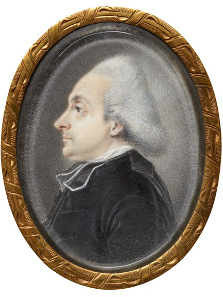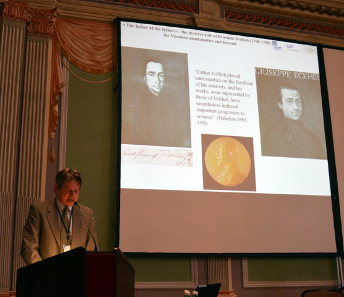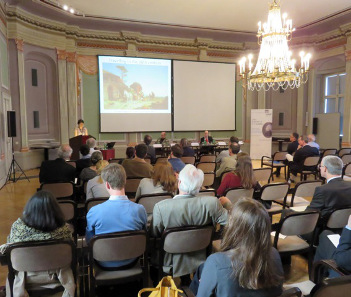By Bernhard Woytek and Daniela Williams
July 23, 2015 – The international conference Ars critica numaria. Joseph Eckhel (1737-1798) and the development of numismatic method took place in Vienna from May 27 to 30, 2015. The congress, organised by Bernhard Woytek and Daniela Williams, was made possible through funding by the Austrian Science Fund (FWF) as part of the project “Joseph Eckhel (1737-1798) and his numismatic network” (project no. P25282).
Joseph Eckhel (1737-1798). © KHM Vienna.
The four-day conference, held at the Austrian Academy of Sciences and the Kunsthistorisches Museum, brought together 21 speakers from Europe and the United States – a heterogeneous group of scholars working in different fields: from ancient numismatics to early modern history, from archaeology to the history of science and scholarship in the Enlightenment, as well as Digital Humanities. For the very first time, the life and work of Joseph Eckhel, the so-called “Father of Numismatics”, were analysed in the broader context of his time.
On May 27, after the opening of the conference, François de Callataÿ and Bernhard Woytek introduced the international initiative Fontes Inediti Numismaticae Antiquae (FINA) as well as the project on Eckhel’s correspondence, which is now in its third year. The keynote speech on the transformation processes of science and scholarship in the age of Enlightenment was delivered by Hans Erich Bödeker (University of Göttingen). As a historian of cultural practices (reading, writing, travelling, modes of sociability), political theories and science in the early modern period, Bödeker provided interesting suggestions and food for thought not only during this presentation, but throughout the whole congress.
F. de Callataÿ presenting his paper. © ÖAW, Vienna.
The first session on May 28 focused on studies before (and contemporary to) Eckhel and how they contributed to shaping his thought and work. Papers provided a general background on collecting and research during the Enlightenment in Austria, an analysis about how Jesuit scholars approached ancient numismatics, a review of the study of ancient art in the 18th century (Montfaucon, Caylus and Winckelmann) and examined the contribution of Erasmus Frölich to Viennese numismatics (speakers: K. Vocelka, J. Guillemain, V. Heenes, F. de Callataÿ).
The second session, which took place at the Kunsthistorisches Museum, centered on systematic approaches to ancient coinage through the centuries, on the arrangement of coin collections, Eckhel’s colleagues, and his day-to-day work at the Imperial coin cabinet (speakers: M. Mulsow, D. Haarmann, K. Vondrovec).
D. Williams presenting her paper. © ÖAW, Vienna.
During the morning session on May 29, papers concentrated on some of Eckhel’s publications. Speakers analysed Eckhel’s first numismatic book, Numi veteres anecdoti (1775), his introduction to ancient numismatics for students Kurzgefaßte Anfangsgründe zu alten Numismatik (1787), as well as the genesis of the 8 volume-work Doctrina numorum veterum (1792-1798) and the models behind the choice of its title (speakers: D. Williams, P. F. Mittag, B. Woytek, A. Burnett).
The exchange between Eckhel and other scholars and collectors was the theme of the afternoon session. Papers covered the reception by Eckhel of the works of the Renaissance antiquary Hubert Goltzius, Eckhel’s relationship with the Italian numismatist Domenico Sestini and with the Dutch book and coin dealer Pieter Van Damme. A paper on Eckhel’s work on ancient engraved gems ended the day (speakers: J. Cunnally, F. Missere Fontana, C. E. Dekesel, Y. M. M. Dekesel-De Ruyck; an abridged version of the paper on gems by G. Tassinari, who unfortunately could not attend, was read by D. Williams).
B. Woytek and M. Mulsow during the session at the Kunsthistorisches Museum. © ÖAW, Vienna.
On the final day of the conference (May 30), two case studies on Greek and Roman numismatics opened the morning session. The first paper explored the reception of Eckhel’s work in Great Britain, while the second one analysed Eckhel’s contribution to the study of the cast coinages of ancient Italy. A presentation on the creation of a virtual research environment for Eckhel’s scholarly correspondence and the planned online publication closed the session. (Speakers: J. Kagan, M. C. Molinari, D. Schopper, M. Mayer).
A very lively plenary discussion followed, during which the participants, on the basis of the new research presented at the conference, tried to better define the various aspects of Eckhel’s contribution to the development of numismatics as a scholarly discipline, and to analyse his actual role in this field of studies.
A group of speakers and participants in front of the monument of Maria Theresa (featuring inter alia a statue of Eckhel); in the background the Kunsthistorisches Museum. © ÖAW, Vienna.
The conference ended with a discussion (chaired by B. Woytek and F. de Callataÿ) on the future of the international initiative Fontes Inediti Numismaticae Antiquae (FINA), which aims at promoting the study of hitherto unpublished numismatic documents from the 16th to the 18th centuries.
The event was a great success with more than 60 registered non-speaking attendees from Vienna, other parts of Austria, many European countries and the United States. It is clear that the history of numismatics is an emerging subject, attracting interest from diverse fields. The interaction among speakers and participants during the discussions following the presentations, refreshment breaks and both formal and informal social gatherings contributed to developing a new understanding of Joseph Eckhel’s scholarly activity. Eckhel was a “founding father” of numismatics who inaugurated a new era without really revolutionizing our discipline from a methodological perspective. He was a scholar exchanging ideas and information with many of his contemporaries, someone who gathered as much knowledge on ancient coins as was available in his day and critically and skillfully systematized it, thereby providing the future generations of scholars with a sound basis on which to build. He combined the true spirit of Enlightenment research with the study of coins, and enabled his followers to develop new approaches to the study of ancient numismatics.
The proceedings of the conference will be published in Vienna. For more information please visit the conference website.









